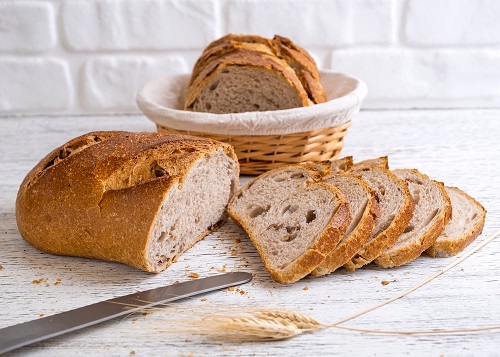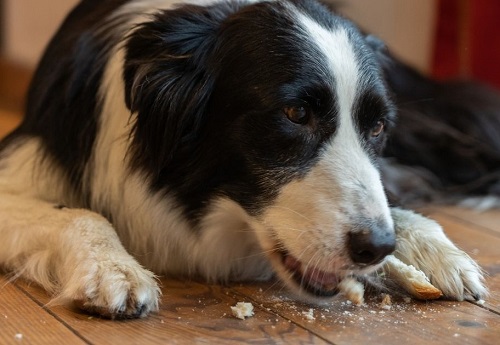Can Dogs Eat Sourdough Bread? Or you should avoid giving them to your pooch? Are there any better alternatives? Let’s find out!
Can Dogs Eat Sourdough Bread? Can you include it in their diet on daily basis, or should you limit it to an occasional treat? Read ahead to know!
What is Sourdough Bread?

Sourdough bread is made from a mixture of flour and water that has been fermented using naturally occurring wild yeast and bacteria. This fermentation process gives sourdough bread its distinctive tangy flavor and chewy texture.
Unlike commercial bread that uses baker’s yeast to rise, sourdough bread relies on the natural fermentation process to create its unique taste and texture. It can be made with a variety of flours, including wheat, rye, and can be baked in different shapes and sizes.
Can Dogs Eat Sourdough Bread?
So, Can Dogs Eat Sourdough Bread? While small amounts of sourdough bread may not harm most dogs, it is generally not recommended to feed it to them. This is because sourdough bread contains yeast, which can cause digestive upset and even in dogs, if consumed in large quantities.
Is Sourdough Bread Bad For Dogs?
It is not necessarily bad for dogs, but it’s not an ideal food for them, either. It may also contain other ingredients that can be harmful to dogs, such as salt, herbs, and other flavorings. Excessive amounts of salt, in particular, can cause dehydration and other health problems in dogs.
Health Benefits of Sourdough Bread for Dogs

While sourdough bread is not a recommended food for dogs on a daily basis, there are some potential health benefits associated with certain ingredients that may be used to make sourdough bread.
For example, if sourdough bread is made with whole-grain flour, it may provide some dietary fiber and other nutrients that can benefit a dog’s digestive health.
Additionally, sourdough bread that contains seeds or nuts may provide healthy fats, protein, and vitamins that can be beneficial for a dog’s overall health and well-being.
A Few Health Concerns of Sourdough Bread
Feeding sourdough bread to dogs can pose several health concerns, including:
- Digestive upset: The yeast and other ingredients in sourdough bread can cause digestive upset in dogs, leading to symptoms such as bloating, gas, and diarrhea.
- Alcohol poisoning: The yeast in sourdough bread can produce alcohol during the fermentation process, and if a dog consumes too much sourdough bread, it may experience alcohol poisoning, which can be potentially life-threatening.
- Salt toxicity: Sourdough bread often contains salt, which can be harmful to dogs if consumed in excessive amounts. Salt toxicity can cause symptoms such as vomiting, diarrhea, lethargy, and seizures.
- Nutritional imbalances: Sourdough bread is not a nutritionally complete food for dogs and should not be relied upon as a primary source of nutrition. Feeding dogs too much sourdough bread can lead to imbalances in their diet and potentially cause health problems over time.
- Allergic reactions: Some dogs may be allergic to certain ingredients in sourdough bread, such as wheat or other grains. Allergic reactions can cause symptoms such as itching, skin irritation, and gastrointestinal distress.
Can Dogs Eat Rambutan? Can Dogs Have Rambutan?
How to Feed Sourdough Bread to Dogs?
It is generally not good to feed sourdough bread to dogs, as it can pose several health risks. However, if you decide to give your dog a small amount of sourdough bread as a treat, there are a few things to keep in mind:
- Choose plain sourdough bread: Avoid giving to your dog that contains added ingredients such as herbs, spices, or nuts, as these can be harmful to dogs.
- Feed in moderation: Only give your dog a small piece of bread as a treat, and limit their intake to avoid potential health issues.
- Watch for adverse reactions: Monitor your dog for any signs of digestive upset or allergic reactions after feeding them sourdough bread.
- Consider alternatives: If you’re looking for a treat to give your dog, consider dog-specific treats or foods that are formulated to meet their nutritional needs.
Can Dogs Eat Broccoli | Is Broccoli Good for Dogs
Why Is Uncooked Sourdough Bread Dangerous For Dogs?

Uncooked sourdough bread can be dangerous for dogs because it contains yeast, which can continue to ferment and produce alcohol in a dog’s digestive system. Raw sourdough bread dough can also contain raw eggs, which can pose a risk of salmonella infection.
Points to Check Before Feeding Sourdough Bread to Dogs
Here are some tips to help you choose a sourdough bread that is safe for your dog:
- Check the ingredients: Look for sourdough bread that is made from simple, whole-food ingredients such as flour, water, and salt. Avoid bread that contains artificial preservatives, sweeteners, or other additives that may be harmful to your dog.
- Avoid sourdough bread with raisins: Raisins and grapes are toxic to dogs and can cause kidney failure if ingested. Avoid any sourdough bread that contains raisins or grapes.
- Check for salt content: While a small amount of salt is safe for dogs, excessive amounts can be harmful. Look for sourdough bread that is low in salt, or consider making your own bread with a reduced amount of salt.
- Offer small portions: Even if you choose a safe sourdough bread, it’s important to offer it to your dog in moderation. Offer small pieces as a treat or snack rather than a significant portion of their diet.
Can Dogs Eat Rye Sourdough Bread?
Yes, dogs can eat rye sourdough bread in moderation. Rye bread is often denser and darker than other types of bread and can be a good source of fiber and nutrients for dogs. Feeding your dog too much bread, including rye sourdough bread, can lead to digestive upset, obesity, or other health issues.
Can Dogs Eat Rye Bread | Is Rye Bread Safe for Dogs?
What is the Best Sourdough Recipe for Dogs?
Here is a basic sourdough bread recipe that can be safely fed to dogs:
Ingredients:
- 2 cups whole wheat flour
- 1 cup rye flour
- 1/2 cup sourdough starter
- 1 1/4 cups warm water
Instructions:
- In a large mixing bowl, combine the whole wheat flour and rye flour.
- Add the sourdough starter and warm water to the bowl and mix until a dough forms.
- Knead the dough on a floured surface for several minutes until it becomes smooth and elastic.
- Place the dough in a lightly greased bowl and cover it with a damp cloth. Let it rest in a warm place for 12-24 hours to allow it to rise.
- After the dough has risen, preheat your oven to 450°F.
- Shape the dough into a loaf and place it on a lightly greased baking sheet or in a loaf pan.
- Bake the bread for 30-35 minutes, or until the crust is golden brown and the bread sounds hollow when tapped.
- Allow the bread to cool completely before slicing it and serving it to your dog.
- Remember to feed sourdough bread to your dog in moderation as part of a balanced diet and to avoid any ingredients that may be harmful to their health, such as onions, garlic, or raisins.
How Much Sourdough Bread Can My Dog Eat?
The amount of sourdough bread that a dog can safely eat will depend on their size, age, and overall health. A few small pieces of sourdough bread per week should be sufficient for most dogs.
The Dangers of Raw Dough for Dogs
Raw dough can be dangerous for dogs to consume. When dogs eat raw dough, the heat from their stomachs can cause the dough to expand, leading to a blockage or obstruction in their digestive tract. This can cause serious health issues and may require emergency medical attention.
The raw dough also contains raw eggs, which can carry harmful bacteria such as Salmonella and E. coli that can cause food poisoning in dogs and humans.
Can Dogs Eat Salmon | Is Salmon Safe For Dogs?
Quick Takeaways
So, Can Dogs Eat Sourdough Bread?Well if you will give them to your pooch in moderation, then they are god to go!
